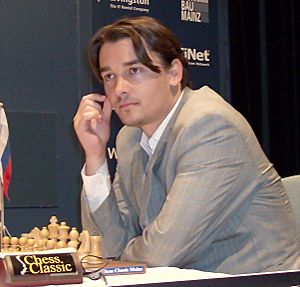Alexander Morozevich facts for kids
Quick facts for kids Alexander Morozevich |
|
|---|---|

Morozevich in 2008
|
|
| Full name | Alexander Sergeyevich Morozevich |
| Country | Russia |
| Born | July 18, 1977 Moscow, Russian SFSR, Soviet Union |
| Title | Grandmaster (1994) |
| FIDE rating | 2659 (February 2026) |
| Peak rating | 2788 (July 2008) |
| Peak ranking | No. 2 (July 2008) |
Alexander Morozevich (born July 18, 1977) is a famous chess player from Russia. He became a Grandmaster, which is the highest title in chess, in 1994.
Morozevich is known for his exciting and sometimes surprising way of playing chess. He likes to take risks and create complicated situations on the board. In July 2008, he was ranked the second-best chess player in the world.
He has won the Russian Chess Championship twice. He also played for Russia in seven Chess Olympiads, helping his team win many medals. He has won several big tournaments multiple times, including the Melody Amber and Biel tournaments.
Contents
Alexander Morozevich's Chess Journey
Early Wins and Grandmaster Title
Alexander Morozevich started his international chess career with a big win in 1994. At just 17 years old, he won the Lloyds Bank tournament in London. He scored an amazing 9½ points out of 10. In the same year, he also won the Pamplona tournament, a victory he repeated in 1998.
In 1997, Morozevich was a top player at the World Junior Chess Championship. He also played in the FIDE World Championship. There, he beat former world champion Vassily Smyslov in the first round. The next year, Morozevich won the Russian Chess Championship.
Playing Against the Best
In 1999, Morozevich played in his first "super-tournament" in Sarajevo. He finished fourth among many strong players. In early 2000, he took part in the Corus chess tournament in Wijk aan Zee. He finished fifth, behind chess legends like Garry Kasparov and Vladimir Kramnik.
Later in 2000, he played in the FIDE World Chess Championship 2000 in New Delhi. He won several matches before being knocked out in the fourth round. In 2001, Morozevich made history at Wijk aan Zee. He became the first player to defeat World Champion Vladimir Kramnik while playing with the black pieces.
World Championship Challenges
Morozevich continued to compete at the highest level. In the 2001 FIDE World Championship, he reached the fourth round. In September 2005, he played in the FIDE World Chess Championship 2005 in San Luis, Argentina. He finished in fourth place, which was a great achievement.
His strong performance in San Luis earned him a direct spot in the World Chess Championship 2007. In that tournament, he finished sixth. He was the only player who managed to defeat the reigning world champion Vladimir Kramnik in that event.
Recent Achievements
In December 2007, Morozevich won the Russian Championship for the second time. He won his last six games to secure the title. In June 2008, he won the Bosna tournament in Sarajevo. He finished 1½ points ahead of the second-place player.
In June 2011, he won the Russian Championship Higher League. This earned him a spot in the Superfinal, where he came in second. In October, Morozevich won the Saratov Governor's Cup in Russia. He finished one and a half points ahead of everyone else.
In February 2012, Morozevich won the Vladimir Petrov Memorial. This was a rapidplay tournament, where players have less time to make their moves. In 2014, he won the 15th Karpov International tournament in Poikovsky. Morozevich also won the Magistral Ciutat de Barcelona tournament in 2015.
Team Competitions
Alexander Morozevich has had great success playing chess as part of a team.
- In the Chess Olympiad, he won the gold medal with the Russian team three times: in 1998, 2000, and 2002. He also won a silver medal in 2004 and a bronze medal in 1994.
- He won the gold medal in the World Team Chess Championship in 2005.
- He also won two gold medals in the European Team Chess Championships in 2003 and 2007.
Playing Style
Morozevich is known for his aggressive and unique playing style. He often uses unusual opening moves in his games. For example, he sometimes plays the Chigorin Defense or the Albin Countergambit. He likes to play in positions that are very complex and tricky.
Because of his risky and exciting style, which often leads to decisive games instead of draws, Morozevich is very popular with chess fans. In 2007, he even wrote a book about the Chigorin Defense with co-author Vladimir Barsky.
Blindfold Chess
Morozevich is considered one of the best blindfold chess players in the world. In blindfold chess, players do not look at the board or pieces. They remember the positions in their mind. He showed his skill in the blindfold sections of the Melody Amber tournaments:
- 2002: First place
- 2004: First place
- 2006: First place
- 2008: Shared first place
Go Game
In recent years, Alexander Morozevich has not played as much competitive chess. Instead, he has started playing the game of Go. Go is an ancient board game from Asia. As of 2018, he had a Go ranking of 1 dan, which is a good level. In July 2016, he even played a special match against chess player Tiger Hillarp Persson. It was a mix of chess and Go games.
See also
 In Spanish: Aleksandr Morozévich para niños
In Spanish: Aleksandr Morozévich para niños
 | Toni Morrison |
 | Barack Obama |
 | Martin Luther King Jr. |
 | Ralph Bunche |

